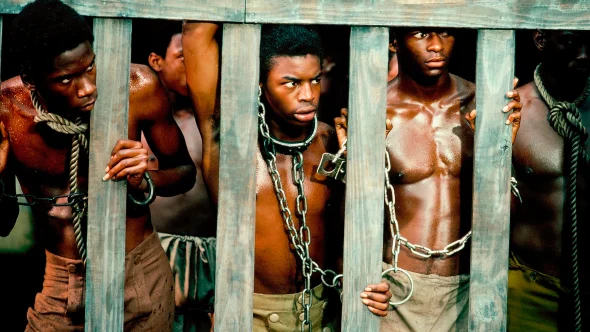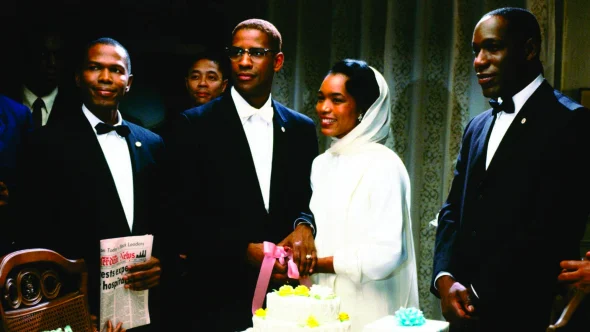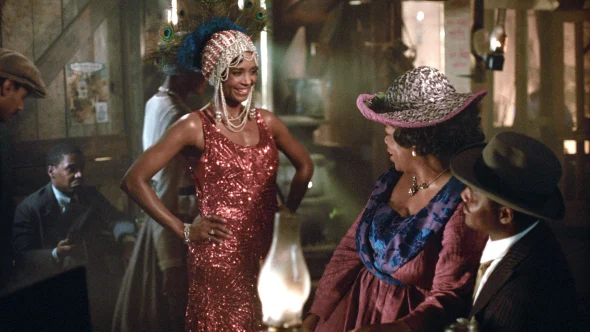
Valerie Scoon worked as an executive at Oprah Winfrey's Harpo Films, and then as a studio executive at Warner Bros. But it wasn't until she began teaching film at Florida State College that she considered directing projects of her own. "I saw students making films up close and personal," she reflects. "At Warner Bros., I saw massive productions coming together, but while teaching at a film school, I would see very small films getting made with maybe six people on the crew."
"When I started becoming interested in documentary filmmaking, people would tell me that to start developing a story, you just have to pay attention to what's going on around you, and what you’d like to tell a story about," Scoon continues. "And documentaries have a way of propelling you into the position of a filmmaker, whether you want to be in it or not. Because if you are the person who's shaping it, you should be the person producing or directing it. So here I am."
Scoon made her directorial debut with 2020's Daring Women Doctors, and followed it a year later with Invisible History: Middle Florida's Hidden Roots, about the history of slavery in the Sunshine State. Her new documentary is Sound of the Police, which she co-directed with Oscar nominee Stanley Nelson, an in-depth look at the fraught relationship between Black citizens and law enforcement from slavery to the present day.
"I was hesitant to become involved in a documentary on such a huge and difficult subject, but finally, Stanley said, 'Don't you have a son?' And I was like, 'Oh, yes, I do,'" Scoon shares. "I went home to talk about it with my husband who suggested that by working on this film, I could contribute to the conversation about policing, rather than yelling at the TV and getting frustrated when something happens. I joined this project in the hopes that it will help move the conversation forward."
Below, Scoon shares with A.frame five films that made an indelible impact on her.

Directed by: Elia Kazan | Written by: Budd Schulberg
One of the earliest films I saw that stays with me is On the Waterfront. I saw it first as a kid, and then many times as I was growing up when it would play on television. I was drawn to this story about a deeply flawed person, a person who has this terrible problem — he's helped to kill the brother of the person he loves — because everybody is flawed, and everybody must find their way through those flaws. Of course, as I got older, the more I understood that the film is all about blacklisting, and I better understood how great the performance is that Marlon Brando gives.

Directed by: Marvin J. Chomsky, John Erman, David Greene and Gilbert Moses
When Roots first aired on television, my family — and I think every other Black family in America — gathered in front of the television. Watching that series is my earliest memory of seeing Black people and their history depicted on TV. The series humanized the enslaved people, giving them loved ones and backstories. It was about their lives and showed history from the enslaved person's point of view instead of from the plantation owner's point of view. It helped me to see that historical stories can have broad appeal, that it's essential to show the humanity of all people, and that it is possible to make popular films about stories that have been overlooked.

Created by: Henry Hampton
I watched Eyes on the Prize for the first time on my own, not as a requirement by any sort of school. I was amazed by its ability to depict the Civil Rights Movement in all of its complexity, because so many times it would be short-handed. It was important to see the movement through the individual actors, and how much courage it took for them: Black and white people, women and men, all these everyday people, taking courage into their own hands. It demonstrated to me that a film could be entertaining and engaging by showing a process, even if you already know the end result of the story. Eyes on the Prize speaks to the crossover between documentaries and narrative programming: What makes these stories work is the emotional journey and the history of the characters.

Directed by: Spike Lee | Written by: Arnold Perl & Spike Lee
When I worked as an executive at Warner Brothers and was working on developing Spike Lee's Malcolm X, I found it helpful to keep looking at the documentary on which it was loosely based, as well as Malcolm X's autobiography. Obviously, the narrative film was a dramatization of his life, but we did need to stick to the facts, and it was helpful to have so many clear touchpoints from the source material.

Directed by: Steven Spielberg | Written by: Menno Meyjes
I read The Color Purple when I was in high school — I went to an all-girls private school — and I found it in the library. I asked the librarian if I could borrow it, but because it had just arrived and hadn't been processed yet, I had to wait for the librarian to review it and give permission for students to read it, which she eventually did. Sometimes when you read a great book, you think, 'Oh, a movie will never live up to this.' But this film exists on its own plane and is still very powerful to me. When I watch it, I still forget that I'm seeing Oprah, or Danny Glover, because the story is so powerful that you get caught up in the world of it.







